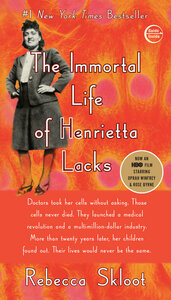Take a photo of a barcode or cover
reflective
sad
medium-paced
challenging
emotional
informative
medium-paced
This story is phenomenal!!! My eyes were truly opened to so many things and so much information I knew nothing about. The respect I have for the Lacks family and what they’ve gone through and dealt with is astronomical! They handled everything I feel very gracefully given the circumstances and I love that all the kids kept coming back to thinking about what their mother would want. I typically read fluffy romances or light thrillers so this was a change in genre but such a great change!
informative
sad
medium-paced
challenging
hopeful
informative
sad
slow-paced
emotional
informative
sad
medium-paced
As a scientist and early lover of biology, HeLa cells are something that I am very familiar with. At school, the only thing that we were taught was that these cancer cells from a woman were cultured and had the ability to live on indefinitely. Beyond that, little was known about this woman who inadvertently made a huge contribution to the field of cell biology.
This book details the life and death of Henrietta Lacks, how her cells were used, and the impact that has had on her family and the entire scientific community. It's a story of race, ethics, consent, and the lengths scientists will go to all in the name of research. The book is riveting, informative, and very necessary.
This book details the life and death of Henrietta Lacks, how her cells were used, and the impact that has had on her family and the entire scientific community. It's a story of race, ethics, consent, and the lengths scientists will go to all in the name of research. The book is riveting, informative, and very necessary.
I consider this book to be the one of the most realistic non-fiction books ever written. I say so because, the facts are written as it is, with no pseudonyms and all the real characters are portrayed as they are in the book. The author Rebecca Skloot clarifies the same point in the beginning of the book.
The book is named so because, the cells of Henrietta Lacks kept on multiplying themselves with no end. And I think the title is very apt.Henrietta Lacks cells were known as HeLa cells among the scientific community. Anybody studying biology or medicine or organic chemistry; I am sure, would be familiar with HeLa cells. Because, it has become such an integral part of the life sciences.
To start with, usually cells have the tendency to multiply themselves. After a certain point they begin to degenerate into non-existence or die per se. But, the lady Henrietta Lacks' cells were an exception. They keep on multiplying and multiplying and there seem to be no limit to it.The Immortal Life of Henrietta Lacks is the story of a woman who died of cervical cancer, and whose cells were taken by the medical practitioners of John Hopkins(the hospital in which she was admitted fo treatmen).
This book has two aspects:the impact of HeLa cells on the life sciences and the scientific community, and the deplorable private lives of the Lacks family.If Deborah, the daughter of Henrietta Lacks had not co-operated, this book would not have had come into existence at all.
The book starts with how, the author Rebecca Skloot came to know about the HeLa cells in one of her biology classes, and how that small hint whetted her curiosity to know more about the HeLa cells made her trace the family of Henrietta Lacks. Initially the family was reluctant to meet anybody inquiring about the HeLa cells. Through her persistence and genuine sincerity to make HeLa cells’ story known to the world, she gains the trust of Deborah, the daughter of Henrietta.From then on, the quest to make Henrietta Lacks known to the world begins.
HeLa cells even now continue to have enormous impact in various fields of medicine such as histology, oncology, epidemiology, oncology etc to name a few.This book is also rife with, how the doctors, without the consent of Henrietta or her family cultured her cells in laboratories, which gave rise to a billion dollar cell culture industry. It is deplorable that, while the pharmaceutical companies were making billions out of her cells, the Lacks’ family were wallowing in poverty and did not have even health insurance in times of need.
The Henrietta’s comparison to Jesus in the one of the final chapters of the book is very apt. Just as Jesus died to save the world, Henrietta left this world, with her cells as a gift to the humanity so that we can be saved from some of the most deadly diseases and syndromes and other pathological conditions since the dawn of civilization.Long live HeLa cells, and may Henrietta’s soul rest in peace!
The book is named so because, the cells of Henrietta Lacks kept on multiplying themselves with no end. And I think the title is very apt.Henrietta Lacks cells were known as HeLa cells among the scientific community. Anybody studying biology or medicine or organic chemistry; I am sure, would be familiar with HeLa cells. Because, it has become such an integral part of the life sciences.
To start with, usually cells have the tendency to multiply themselves. After a certain point they begin to degenerate into non-existence or die per se. But, the lady Henrietta Lacks' cells were an exception. They keep on multiplying and multiplying and there seem to be no limit to it.The Immortal Life of Henrietta Lacks is the story of a woman who died of cervical cancer, and whose cells were taken by the medical practitioners of John Hopkins(the hospital in which she was admitted fo treatmen).
This book has two aspects:the impact of HeLa cells on the life sciences and the scientific community, and the deplorable private lives of the Lacks family.If Deborah, the daughter of Henrietta Lacks had not co-operated, this book would not have had come into existence at all.
The book starts with how, the author Rebecca Skloot came to know about the HeLa cells in one of her biology classes, and how that small hint whetted her curiosity to know more about the HeLa cells made her trace the family of Henrietta Lacks. Initially the family was reluctant to meet anybody inquiring about the HeLa cells. Through her persistence and genuine sincerity to make HeLa cells’ story known to the world, she gains the trust of Deborah, the daughter of Henrietta.From then on, the quest to make Henrietta Lacks known to the world begins.
HeLa cells even now continue to have enormous impact in various fields of medicine such as histology, oncology, epidemiology, oncology etc to name a few.This book is also rife with, how the doctors, without the consent of Henrietta or her family cultured her cells in laboratories, which gave rise to a billion dollar cell culture industry. It is deplorable that, while the pharmaceutical companies were making billions out of her cells, the Lacks’ family were wallowing in poverty and did not have even health insurance in times of need.
The Henrietta’s comparison to Jesus in the one of the final chapters of the book is very apt. Just as Jesus died to save the world, Henrietta left this world, with her cells as a gift to the humanity so that we can be saved from some of the most deadly diseases and syndromes and other pathological conditions since the dawn of civilization.Long live HeLa cells, and may Henrietta’s soul rest in peace!
emotional
hopeful
informative
reflective
medium-paced
emotional
funny
informative
medium-paced




